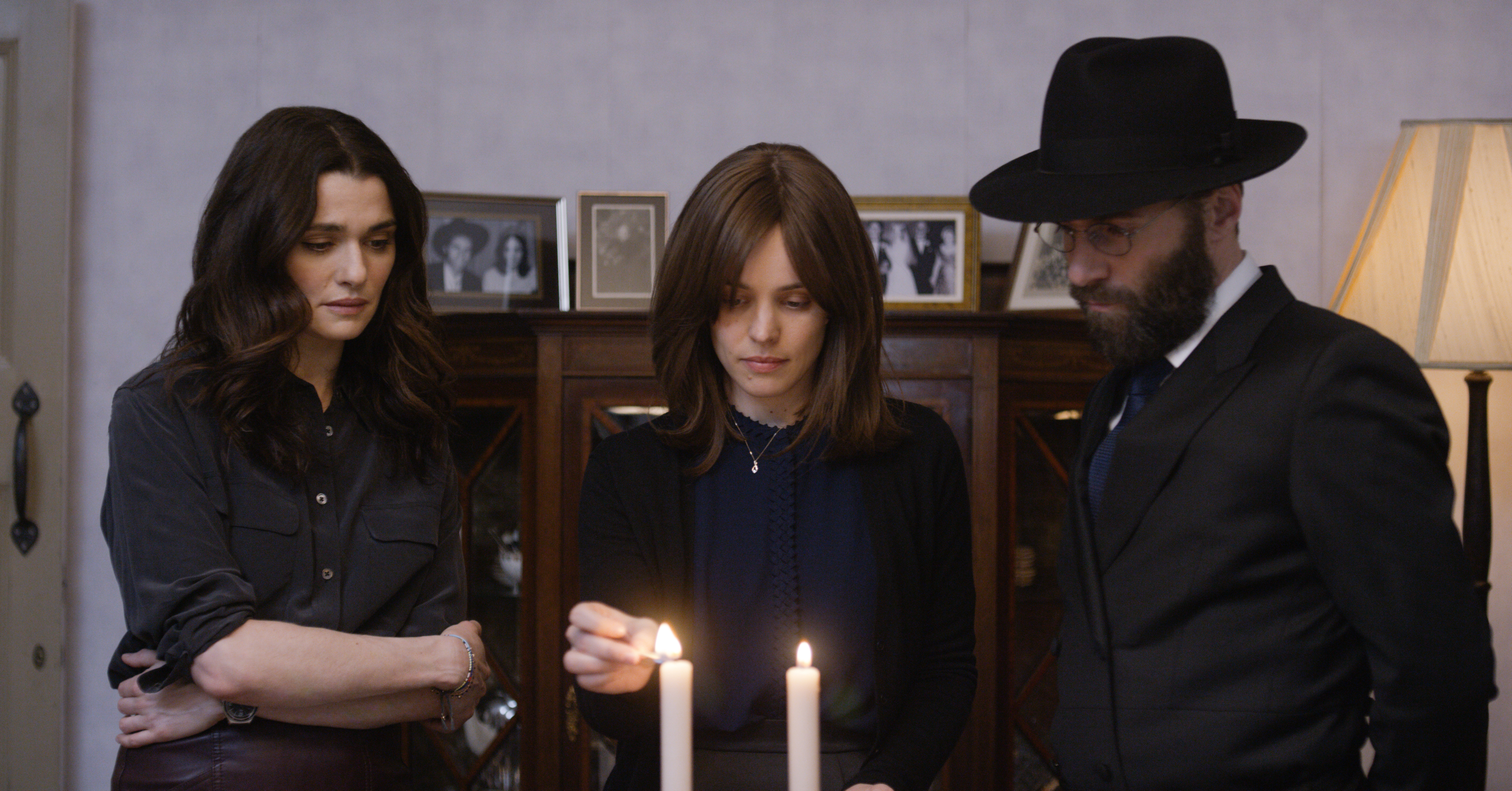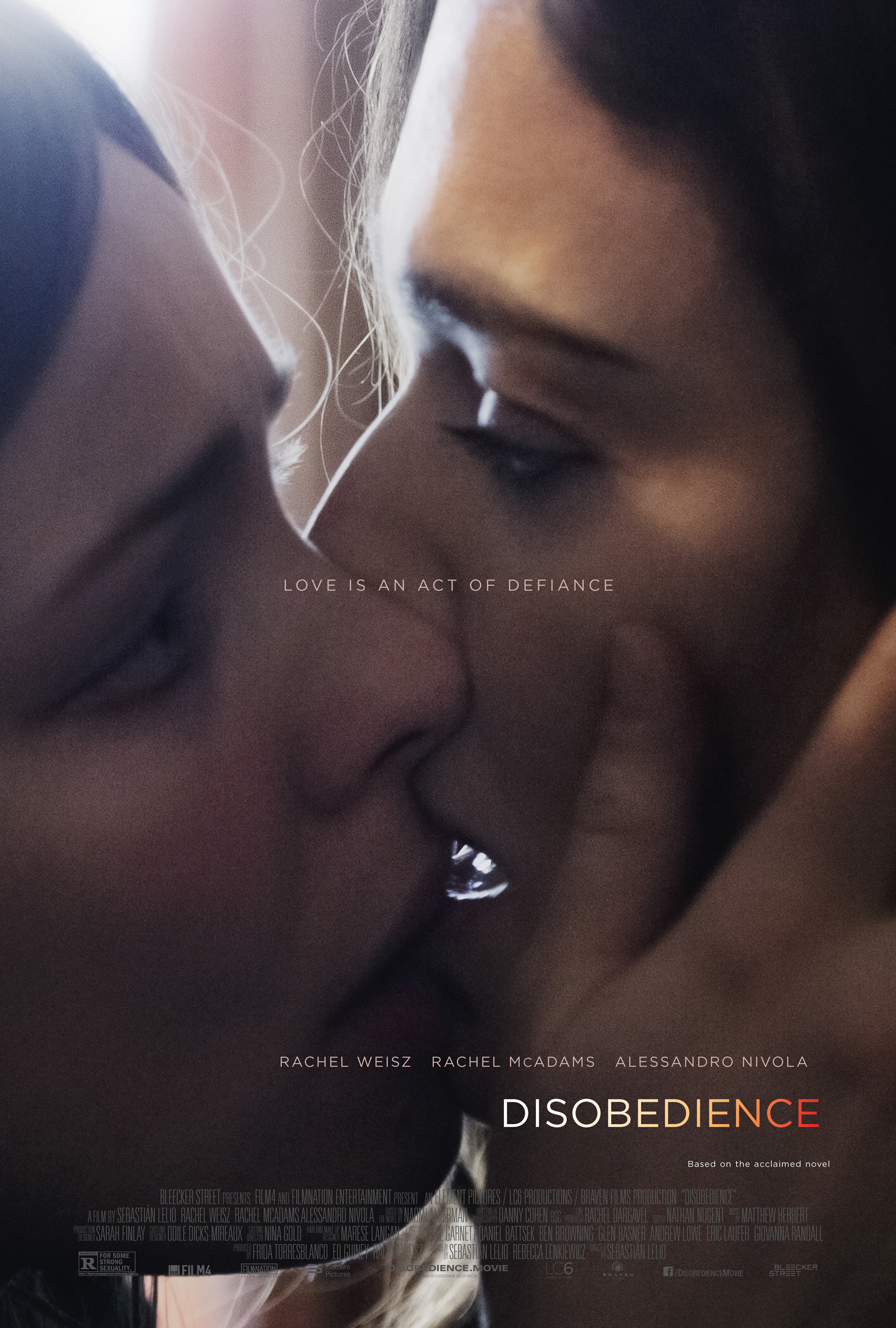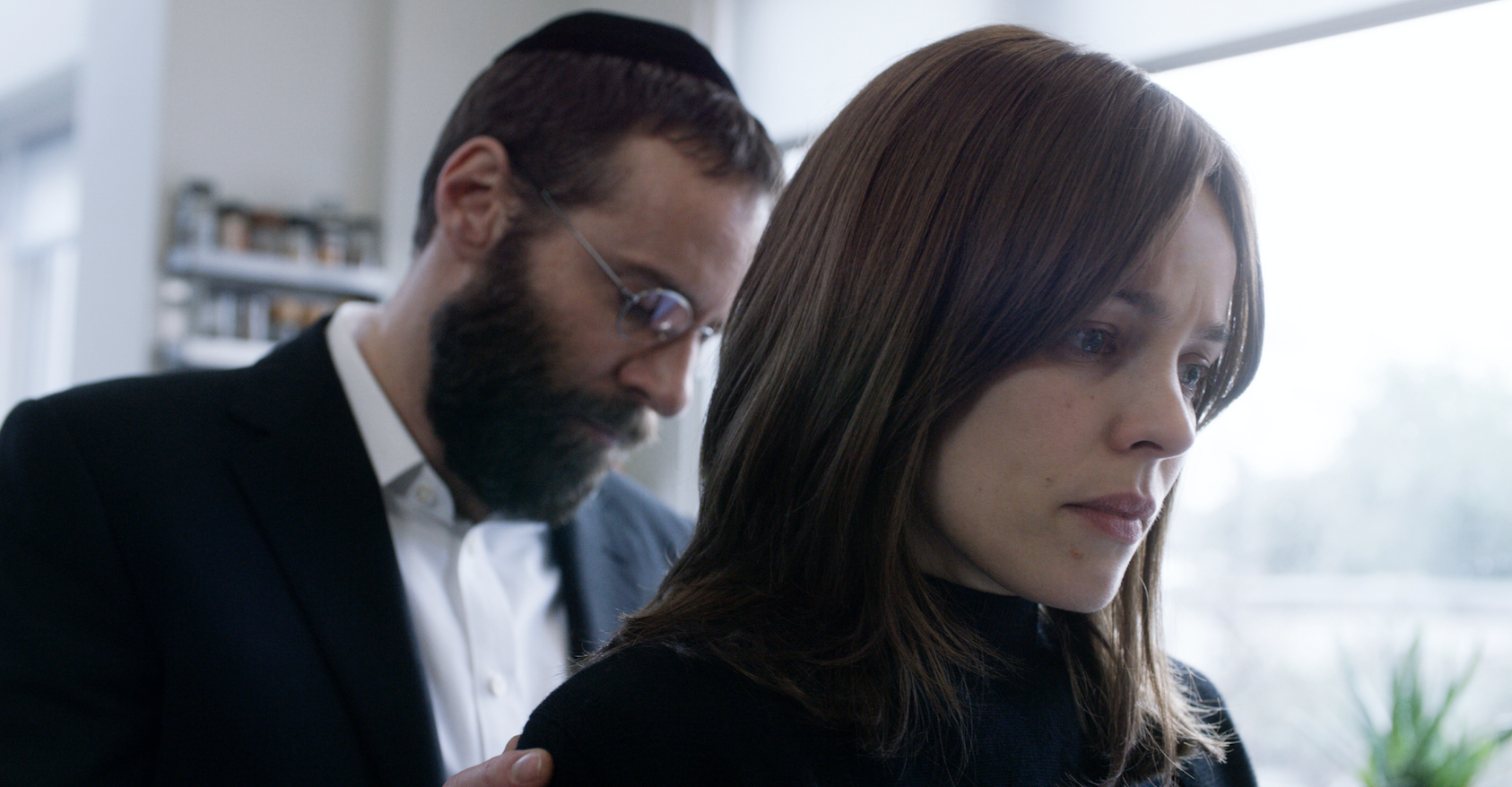When I first saw the trailer for Disobedience, the new movie starring Rachel Weisz and Rachel McAdams, it immediately piqued my interest. The movie, based on a novel of the same name by Naomi Alderman, tells the story of a woman who returns to the Orthodox community that shunned her for being attracted to another woman.
As soon as I saw McAdams rocking Orthodox attire in the trailer — including a sheitel (Yiddish for wig) — I knew I needed to see this movie. I grew up in an Orthodox community in New Jersey, and while this film takes place in London, I was curious to see how they’d handle it.
Of course, it can be tricky to depict a complicated, nuanced community of any kind on screen. It’s clear the people behind this project were aware of this and brought on advisers to help guide the production. In doing so, they get a lot right about Orthodox Jews, and many of the details in the film really show the care they took. The film’s costume designer, Odile Dicks-Mireaux, said that she essentially approached the film as costume drama, which is kind of brilliant:
“Even though we’re telling a contemporary story, it’s actually more of a costume film than you might expect. We had to shop in some places that I wouldn’t normally shop, which was fascinating. I met some incredibly generous people who advised me on this project.”
That said, they didn’t get everything right. Let’s fact-check, shall we?
Clothes
Let’s start with the clothes. They get some serious snaps for how well this is done. The clothes really looked organic and realistic to the community they were depicting. They even showed a body suit, which is sometimes worn by Orthodox women under clothes as a way to ensure coverage. That’s the kind of thing you couldn’t just guess based on looking at photos of what Orthodox women wear — someone who is in the know would have to tell you.
But the costume designers took this look beyond just dress. Hair is a big part of communal norms too, and the filmmakers show how much they got that — McAdams’ character, Esti, has a wig that is spot on. It really looks like the type a woman in this community would wear — namely dark hair, medium-length, with some distinctive layers framing the face. Likewise, the beards used for Orthodox men in a lot of film and TV are often a little false looking, like they’ve been glued on. Generally speaking, the beards in this film seemed legit.
Overall clothing grade: A+
Language
This is really hard to get right in Hollywood movies. In Israeli movies, the actors have the advantage of being native Hebrew speakers, so sometimes the language barrier is less obvious in Israeli films depicting the Orthodox community. In this movie, it’s hit or miss, but a few striking example stuck out.
Right:
“Nisht Shabbos gerecht”: During a tense Friday night dinner scene where Rachel Weisz’ character, Ronit, wants to learn more about her late father’s finances, she’s answered with the Yiddish phrase, “Nisht Shabbos gerecht,” which essentially means, this isn’t appropriate to speak about on the Sabbath. Super specific, and spot on.
Probably right but:
“May you live a long life”: Characters repeat this phrase throughout the film. It’s a reference to a Hebrew phrase “Hayim Aruchim,” which literally means a long life, but it wouldn’t be repeated this frequently. I can’t recall ever hearing this phrase in any Orthodox community I’ve spent time in, but it seems it is actually used in British or Commonwealth Jewish communities. Guess I need to visit London!
Not quite right:
Shir HaShirim: The film depicts the main male character, Dovid, as studying the biblical book Song of Songs with some fellow yeshiva students, all of which is done in English. I get it’s a movie, but if three Orthodox men were studying a text in a yeshiva, they would be reading the text out loud in Hebrew first, and then, depending on what they were discussing, translate it.
Side note: Their discussion moves immediately to the sensuality of Song of Songs, and that felt a little too on the nose to me. Let’s just say it’s more likely they’d be spending their time on, say, literally anything else before discussing breasts and sensuality explicitly in a yeshiva in English (they might use some of the Hebrew phrasing to distance themselves from the explicit language, for instance).
Just plain wrong:
Hashem in prayers/blessings: At several points throughout the film, blessings are recited, including during Shabbat candle lighting, Friday night Kiddush over the wine, and a group of female students singing the last of the morning prayers. In all three, they replace the name of God in Hebrew with “Hashem,” which literally just means “The Name.” This stems from the custom that saying God’s name is really special, and you’d only want to do it for holy purposes. Otherwise, you could be “taking God’s name in vain.”
It’s true that in Orthodox communities, when referring to God, Hashem would typically be the word used instead of God’s name. The exception to that would be during prayer and other moments deemed holy — that’s when you’d actually say God’s name. My theory is the advisers thought it was preferable to depict the scene slightly off, rather than have actors say the name of God “in vain” (which they would be, since they were acting, not actually making a blessing). It’s an odd choice, since people from non-Orthodox backgrounds who know these blessings (like anyone who went to Hebrew school) would notice the use of the word Hashem and wonder why the blessing seemed off. Team Alma posed this question to Disobedience producer Frida Torresblanco, who said the Jewish advisors for the film (which consisted of four rabbis) explained “for this particular community in Hendon — which is not ultra-Orthodox, they’re just Orthodox — that’s the way they’re doing the prayers.” All I can say is, it’s not how any Orthodox community I’ve ever been in would say an actual blessing or prayer.
Weisz’s pronunciation of the “het”: This is really no one’s fault, but Rachel Weisz’s character Ronit sings a short ditty that includes the phrase “chai.” The issue? Her pronunciation is closer to “hai,” and someone who grew up in this community would pronounce that word with a sound that’s more like “ch” instead of “h.”
Overall language grade: B
Tunes
It’s important to use real songs and tunes that the Orthodox community would actually use. This is extra challenging, because not only do the actors need to speak in a foreign language, they need to learn a specific tune that feels realistic to the community they are depicting. I give them a lot of credit, because they actually nail the tunes quite well, including “Dovid Melech Yisrael” and “Yigdal.” A male choir belts out “El Maleh Rachamim” and “If I Forget Thee Jerusalem,” but my guess is these aren’t actors but actually choir singers who already knew the tunes.
Side note: A scene that juxtaposes the choir’s rendition of “If I forget Thee Oh Jerusalem” transitions into a new scene, with a prop on the wall that states in Hebrew “If I Forget Thee Oh Jerusalem” — a small nod that I’m not even sure the filmmakers knew about!
Overall tunes grade: A
Customs and Practices
Right:
A kosher kitchen: A home with a kosher kitchen is shown with two sinks (one for meat and one for dairy). They also had some prominently placed kosher products. I spotted a jar of Geffen matzah meal and a bottle of Kedem bubbly grape juice (I prefer their peach version, but there’s no accounting for taste).
Wrong:
A whole challah left out in the kitchen on a weekday: A whole challah would generally be eaten on Shabbat. If they were eating challah on a weekday, it would be leftover pieces from Shabbat. This isn’t a hard and fast rule — you can eat challah whenever — but just unlikely that they would have a whole challah sitting around in the middle of the week.
Shabbat candlesticks, with candles in them, in the background of the kitchen: This family is shown lighting the candles earlier, in the dining room where these candles would likely live (not the kitchen where they would just be in the way). It’s something I’ve seen lots of set designers do when trying to depict a Jewish home, often displaying menorahs or candlesticks, but this stands out in an otherwise accurate set.

Shiva house: Early in the film, we go inside a home in a community that is mourning the loss of their rabbi and leader. The home seems to be keeping many shiva customs correctly, including the covering of mirrors, keeping the front door open so that people can just come and go, and of course, a spread of food to eat. But, here’s the catch: There is no one who would be considered a mourner according to Jewish law in the home. That would have to be an immediate family member or spouse.
The only person who could be considered a mourner according to Jewish law for this rabbi would be Ronit, Weisz’s character, since this is her father, but she comes to the house that already has mirrors covered, as if someone is already sitting shiva. They introduce us to other relatives, but later make it clear they are from the rabbi’s late wife’s side. It’s entirely realistic that a home in a tight-knit community would be a gathering place to mourn. But they probably wouldn’t be covering mirrors as though there was someone there who was a mourner.
Touch: Early in the film, Ronit leans in to hug her old friend Dovid, who’s a part of the Orthodox community Ronit has since left. He brushes her off, and she suddenly remembers she can’t touch him, according to the laws of shomer negiah. I didn’t buy it. Someone who grew up in that community, no matter how long they’ve been away, wouldn’t forget she can’t hug a man in that community. Furthermore, they later show Dovid getting very close to Ronit, almost touching her more than once. It’s not sexual, per se, but that kind of closeness wouldn’t happen. He’d have always learned to keep his distance no matter what (barring life-threatening reasons). At the end of the movie, Ronit, Dovid, and Esti embrace in a three-way hug. This actually bugged me the least of all these scenes, since it seemed the most obvious that this was a Hollywood ending, not a realistic portrayal of how people in this community would behave.
Right??
Hesped: The film builds towards an event that the characters call a Hesped, which is Hebrew for a eulogy. I’ve only heard that word used in the context of a eulogy given at a funeral or burial, but the event they depict in the film takes places after shiva is over, while the funeral happens before shiva begins. While I’ve never seen or even heard of such an event, it seems like it is done for some big rabbis.
Overall customs grade: B-
Sex
Time for the fun stuff. There’s a point at which Weisz’ character Ronit asks McAdams’ character Esti if she has sex every Friday night, to which Esti responds that it is encouraged but not mandatory. That’s a common trope around observant Jewish coupling (the idea being that having sex is a commandment or mitzvah, and Shabbat is a time for pleasure, so on Shabbat there is a double mitzvah to have sex) — but it is overemphasized. In truth, Esti and her husband’s sex lives would be structured around the laws of niddah, which would mean they are likely only sleeping together two weeks out of every month (and therefore, two Friday nights a month at most). There is a nod to these laws in the film, since if you squint, you can see that Esti and Dovid have two separate twin beds next to each other, which is a way for them to separate while she is in niddah.
Overall sex grade: B+

In the end, I was impressed by how much the film got right. In truth, the things they missed or fudged stood out precisely because they managed to depict so much correctly — which is not an easy thing to do. Nice work, Disobedience!
Overall accuracy grade: B+



